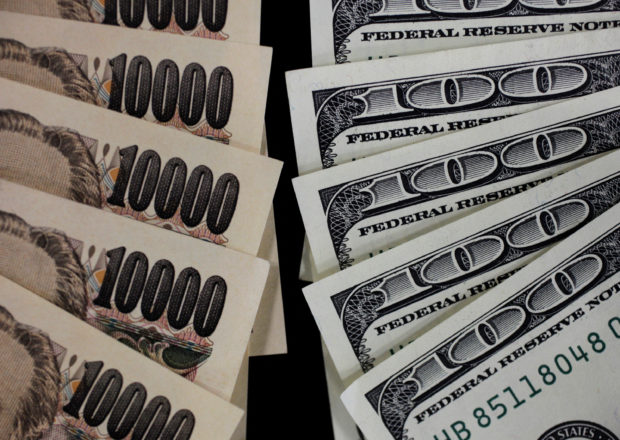Fear over bank turmoil sparks flight to safe haven currencies

A picture illustration shows U.S. 100 dollar banks and Japanese 10,000 yen notes taken in Tokyo. REUTERS/Yuriko Nakao/File photo
SINGAPORE – Safe haven currencies like the U.S. dollar and the yen were in bid on Thursday on renewed fears of a global banking crisis, after contagion from the implosion of U.S.-based Silicon Valley Bank had spread across the Atlantic to Swiss bank Credit Suisse.
In the latest blow to investors’ confidence in the financial sector, Credit Suisse’s shares on Wednesday plunged as much as 30 percent, after its largest shareholder said it could not provide further support to the bank.
The rout in its shares prompted the Swiss National Bank to throw a financial lifeline to the embattled lender, in an unprecedented move by a central bank, and Credit Suisse announced in early Asia trade on Thursday it would borrow up to 50 billion Swiss francs ($54 billion) from the bank.
Swiss central bank throws financial lifeline to Credit Suisse after shares pummeled
Traders flocked to traditional safe haven currencies, boosting the dollar and the Japanese yen, on mounting worries that the recent stress unfolding across banks in the U.S. and Europe could be a harbinger of a widespread systemic crisis.
The yen jumped about 0.5 percent in early Asia trade and last stood at 132.73 per dollar, extending Wednesday’s 0.6 percent gain.
Against the Swiss franc, the dollar pared some of its previous session’s 2.15 percent surge – the largest daily gain since 2015 – but kept the Swiss franc pinned near a one-week low.
“We’ve got some fresh turmoil in the European banking sector and things are still very fluid at the moment,” said Carol Kong, a currency strategist at Commonwealth Bank of Australia (CBA).
“Given the elevated uncertainties and concerns about broader financial contagion, the dollar, as well as the yen, will be the main beneficiaries because of safe haven demand.”
The euro was nursing deep losses in early Asia trade, last rising 0.04 percent to $1.0582, after tumbling 1.4 percent in the previous session. Likewise, sterling gained 0.18 percent to $1.20775, having fallen close to 0.9 percent on Wednesday.
Against a basket of currencies, the U.S. dollar index was last 0.07 percent lower at 104.58, after jumping nearly 1 percent in the previous session.
Credit Suisse, which is battling to recover from a string of scandals that have undermined the confidence of investors and clients, was the latest casualty to be caught up in a crisis of confidence after the collapse of SVB last week.
SVB’s shutdown on Friday, followed two days later by the collapse of Signature Bank, forced U.S. President Joe Biden to rush out assurances the financial system was safe and prompted emergency U.S. measures giving banks access to more funding.
Investors remain on tenterhooks as they await further clarity on how widespread the fallout could be, with rescue measures from authorities doing little to soothe heightened fears thus far.
Focus also turns to how central banks will navigate their paths on future rate hikes, with policymakers left in a bind on how much further they should raise rates to stem inflation without triggering a financial sector shakeout.
The European Central Bank meets later on Thursday and is due to announce its interest rate decision following the meeting. Traders’ bets on a 50-basis-point rate hike have evaporated quickly as the rout in Credit Suisse shares fanned concerns about the health of Europe’s banking sector.
ECB likely to stick to big rate hike despite banking turmoil, source says
Two supervisory sources told Reuters that the ECB has contacted banks on its watch to quiz them on their exposure to Credit Suisse.
“There is certainly a risk that the ECB will not follow through with its pre-commitment of a 50-basis-point hike because of financial stability concerns,” said CBA’s Kong.
“It will definitely be a tough call for any major central bank to stick with its tightening path.”
Elsewhere, the risk-sensitive Australian and New Zealand dollars were struggling to make headway after having slid close to 1 percent each on Wednesday.
The Aussie was last 0.19 percent higher at $0.6634, while the kiwi fell 0.26 percent to $0.6172, further pressured by weak economic data released on Thursday which showed New Zealand’s economy shrinking in the fourth quarter.
Read Next
Subscribe to INQUIRER PLUS to get access to The Philippine Daily Inquirer & other 70+ titles, share up to 5 gadgets, listen to the news, download as early as 4am & share articles on social media. Call 896 6000.
For feedback, complaints, or inquiries, contact us.
For all the latest Business News Click Here
For the latest news and updates, follow us on Google News.



